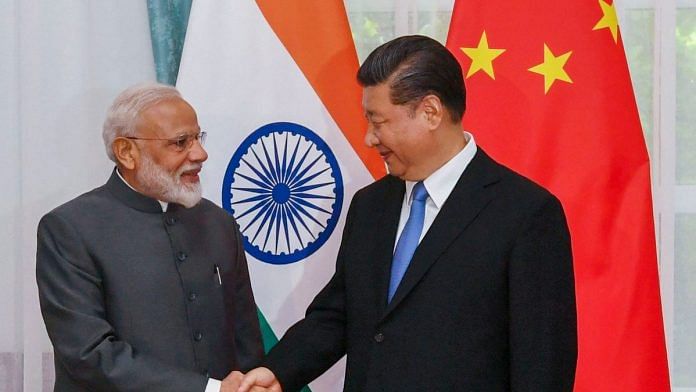India is right to engage with China. But it has sent out signals of displeasure
Harsh V Pant | Professor at King’s College, London and director of studies at Observer Research Foundation, New Delhi
Hindustan Times
The first informal summit between Chinese President Xi Jinping and Prime Minister Narendra Modi in Wuhan, China was held shortly after a long “face-off” between the armies of the two countries in Sikkim. This summit was crucial in easing tensions. The second summit will occur in the context of India’s decision to nullify Article 370 of which China has been a vocal critic and open supporter of Pakistan on this.
China has not shown much interest in a “productive partnership” but is still India’s most important neighbour. It is under pressure from the US, its own economic slowdown, the Hong Kong protests and an increasing global scrutiny on the alleged abuse of Uighur Muslims. This gives India an advantage.
India cancelled the visit by Chinese state councillor and foreign minister to India last month. The Indian Army carried out an “integrated exercise” in Ladakh and Operation ‘Him Vijay’ in Arunachal Pradesh days before Xi’s visit. India wants to tell China that it too can “raise the stakes”. “The ball is now in Xi’s court” to mend fences, concludes Pant.
Azim Premji |Founder chairman of Wipro Limited
The Indian Express
Premji writes that after his mother, it was Mahatma Gandhi who had the biggest influence on his ideas of what he should do with the privilege of his wealth. Gandhi’s idea that the wealthy must be trustees of their wealth for the “larger good” of people resonated with Premji, and he lists some Gandhian ideas inherent in the idea of trusteeship.
First, is the understanding that wealth inequality may not be desirable but it does not make the riches of people illegitimate. Second, wealth and resources must help better society. Third, the responsibility of this betterment lies with those who own wealth. Fourth, there must be faith in human nature that “people will do the right thing” if trusted.
Gandhi influenced an entire nation without having any “formal” power. His ideas of “moral leadership” were visible in three aspects of his behaviour. The first was his “relentless pursuit of truth”. The second was his emphasis on means over ends. The third was his innate “empathy and humanness”. Leaders will realise that “the power of position diminishes with time, whereas moral leadership endures”, concludes Premji.
A half-trillion-dollar shift away from China
Neelkanth Mishra | Co-head of Asia Pacific Strategy for Credit Suisse
Business Standard
Mishra identifies two major reasons why “there has not been a more aggressive shift away from China” in the manufacturing sector. First, China has the manufacturing capacity to export to the US, meet its domestic demand and that of other non-tariff markets. Second, goods sold directly to US consumers like toys come “under duties only in the final list”.
However, demand volumes in China are changing due to its rising dependency ratio and therefore manufacturing has started to move away from the country. “The main reason is the shrinking Chinese workforce,” writes Mishra, and Chinese exports will also be “exacerbated by growing domestic demand”. According to Mishra, “$350-550 billion exports could switch out of China.”
This is a massive opportunity for India. Large technology firms are already setting up base in the country. However, high-technology and apparel manufacturers are choosing not to come here. This is due to “high import duties on chemicals” used for synthetic yarn which is stunting “the whole value-chain”.
Reviving growth: What could spur income tax rate cuts
Indranil Sen Gupta | Chief India economist, Bank of America Merrill Lynch
Aastha Gudwani | India economist, Bank of America Merril Lynch
The Financial Express
Gupta and Gudwani write that income-tax cuts, if introduced, will cost the government Rs 1,750 billion or 0.8 per cent of the GDP. “Rs 1,000 bn will be borne by the Centre and Rs 750bn by states in line with the 58:42 devolution ratio,” they write. However, income tax cuts would also help in solving the “2018 liquidity crunch that has pushed up lending rates and hurt demand”.
They identify three preconditions for income-tax cuts. First, they recommend that investors track demand during the Diwali week and if it is muted then tax cuts can be introduced. Second, RBI will introduce cuts “if banks do not pass on the 25bps October 4 RBI rate-cut even after linking retail/SME loans to external benchmarks like the RBI repo rate”. Third, funding for the corporate tax cut needs to be figured out before introducing any others – Gudwani and Gupta recommend stepping up open market operations and foreign portfolio investment.



